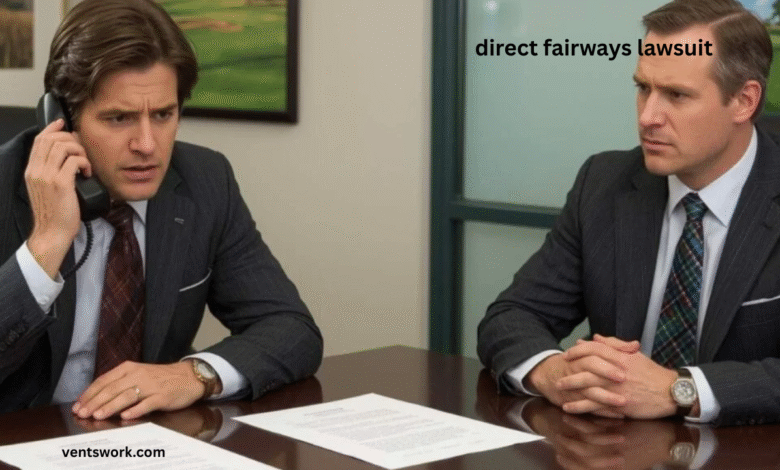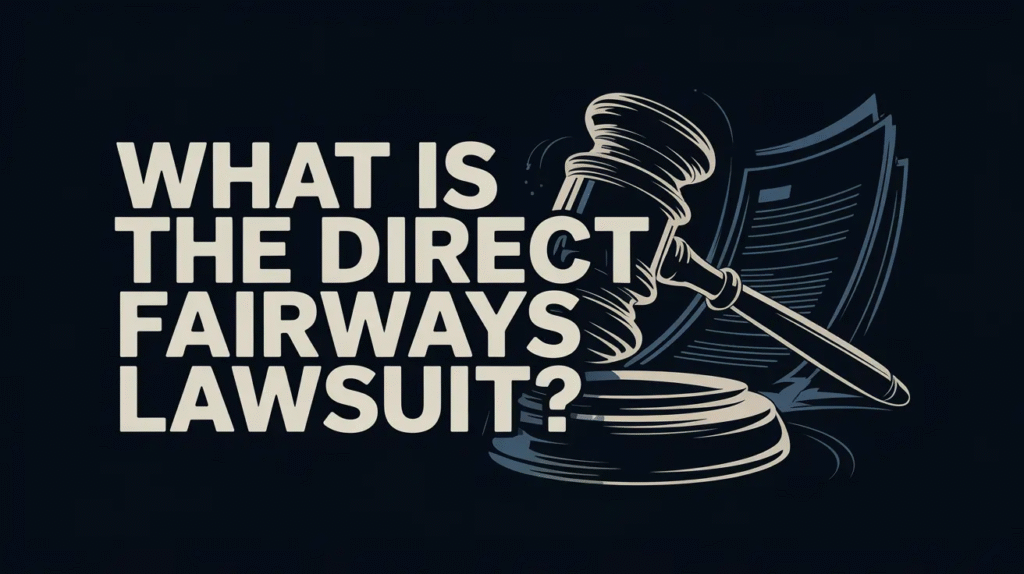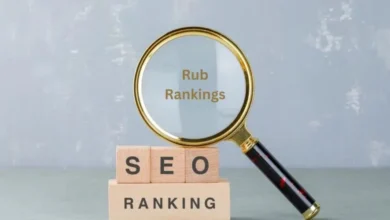The Truth Behind the Direct Fairways Lawsuit

Direct fairways lawsuit, businesses are increasingly under the public microscope—especially marketing companies that promise high ROI for small and midsize enterprises. One such company that found itself in hot water is Direct Fairways, a marketing firm known for its work with golf courses. Over the years, Direct Fairways built a recognizable name in golf course advertising, but it also drew criticism from disgruntled clients. These frustrations culminated in a full-blown legal confrontation that grabbed headlines and sparked discussions in the marketing and legal communities alike.
This article takes a deep dive into the Direct Fairways lawsuit, uncovering the company’s history, the nature of the legal action, the implications for its clients and employees, and what it all means for ethical marketing in the future. Whether you’re a business owner seeking insights into legal pitfalls or a curious consumer following high-profile lawsuits, this piece is your one-stop resource for understanding what really happened behind the scenes.
Understanding Direct Fairways: Company Background
Direct Fairways is a marketing and advertising firm specializing in promotional services for golf courses. Established with a mission to provide innovative, low-cost advertising solutions, the company offered a range of products including printed scorecards, course signage, and direct mail campaigns. Its primary clients were local businesses and golf courses across the United States. These services aimed to boost brand visibility by placing ads in high-traffic golfing environments.
On the surface, the company appeared legitimate and successful. Their business model was simple: sell advertising space on golf course materials direct fairways lawsuit to local businesses, then distribute those materials to partnering golf courses. This created a win-win situation—for advertisers looking for targeted exposure and for golf courses seeking affordable, high-quality materials.
However, over time, cracks began to appear. Numerous clients began complaining about delayed deliverables, lack of communication, and poor customer service. Despite its growing footprint in the golf industry, the company began accumulating negative reviews on platforms like the Better Business Bureau and Yelp. Allegations of high-pressure sales tactics and unfulfilled promises began to tarnish Direct Fairways’ reputation, setting the stage for the legal troubles that would follow.
The Legal Storm: Overview of the Lawsuit

The lawsuit against Direct Fairways stemmed from a series of allegations made by former clients and regulatory authorities. At the heart of the case were accusations of false advertising, deceptive sales tactics, and breach of contract. According to complainants, the company frequently failed to deliver on its marketing promises—particularly with respect to product quality, distribution timelines, and advertising reach.
Some clients claimed they paid thousands of dollars for ad placements that never materialized or were never properly distributed to golf courses as promised. Others reported that the company’s representatives employed aggressive direct fairways lawsuit telemarketing techniques and misled businesses about the scope and visibility of the campaigns. These claims caught the attention of state-level consumer protection agencies, and eventually, formal legal action was initiated.
In several states, Direct Fairways was accused of violating consumer protection laws, particularly those related to business transparency and truthful advertising. Some lawsuits involved individual businesses, while others were class-action in nature, combining the grievances of multiple affected parties. The mounting legal pressure brought the company’s practices under scrutiny and forced a broader conversation about ethics in niche marketing industries.
Key Developments and Court Proceedings
As the lawsuit gained momentum, a clearer picture of the case’s complexities began to emerge. Initial court filings included customer affidavits, call transcripts, and email correspondence that allegedly demonstrated a pattern of direct fairways lawsuit deceptive behavior. These pieces of evidence formed the backbone of the prosecution’s case, illustrating how the company misrepresented the reach and effectiveness of its marketing services.
One of the pivotal moments in the legal battle was the discovery process, where internal communications from Direct Fairways were subpoenaed and reviewed. These documents reportedly showed instances where sales teams were encouraged to make exaggerated claims in order to close deals. While the company denied any wrongdoing, the volume of evidence began to tip the scale.
The defense argued that any delays or issues stemmed from logistical challenges and miscommunications, not intentional fraud. However, this explanation failed to satisfy many plaintiffs or the court. In some jurisdictions, the court granted preliminary rulings in favor of the plaintiffs, ordering Direct Fairways to issue partial refunds and direct fairways lawsuit amend its sales practices.
The case also received media coverage, especially in local news outlets and online business forums. This publicity further damaged the company’s reputation and created a public relations crisis that was difficult to contain.
Impact on Clients, Employees, and Industry
The ripple effects of the Direct Fairways lawsuit were felt throughout the company’s network. Small businesses, many of whom had limited marketing budgets, found themselves at a loss after investing in campaigns that yielded little to no return. Some even reported that their association with Direct Fairways damaged their own credibility, especially if the promised ads never appeared in golf course materials.
For employees, the lawsuit created an atmosphere of uncertainty. Reports surfaced of mass resignations, internal audits, and restructuring efforts. Sales staff were particularly affected, as many of them had built their compensation plans around commission structures that were now under scrutiny. Some employees also claimed they were pressured to meet unrealistic sales targets, leading to ethical lapses and job dissatisfaction.
From an industry standpoint, the lawsuit sparked broader concerns about regulation in the marketing sector, particularly for companies that operate in niche verticals like golf. Competitors began using the lawsuit as a cautionary tale, emphasizing direct fairways lawsuit transparency and ethical conduct in their own campaigns. Industry watchdogs, too, began taking a closer look at companies using high-pressure telesales models, suggesting that the fallout from this lawsuit may help drive more accountability across the board.
Aftermath and Current Status of the Case
As of the most recent updates, the Direct Fairways lawsuit has led to several settlements and ongoing investigations in certain states. In jurisdictions where judgments were issued, the company was required to compensate affected clients and cease specific marketing practices deemed misleading. While Direct Fairways is still operational in some form, its business model has undergone significant changes to comply with legal mandates.
In an official statement, company representatives acknowledged some past mistakes but maintained that their intention was never to deceive. They claimed to have implemented corrective measures, including improved training for sales staff, updated contracts, and better tracking of deliverables.
Despite these reforms, the damage to the brand’s reputation has been substantial. Many clients remain skeptical, and online forums continue to feature mixed reviews about the company’s conduct. For many, the lawsuit serves as a lasting reminder of the importance of transparency, ethical sales, and customer trust.
Legal and Ethical Takeaways for Businesses
The Direct Fairways case highlights critical lessons for both businesses and consumers. First and foremost, it underscores the necessity of clear and honest communication in sales. Overpromising and underdelivering can not only result in direct fairways lawsuit unhappy clients but also lead to severe legal consequences. Contracts must be transparent, and all terms should be explicitly defined to avoid misunderstandings.
For marketing companies, the lawsuit illustrates why compliance with consumer protection laws should never be overlooked. Whether it’s adhering to telemarketing regulations or fulfilling contractual obligations, every facet of a business must be held to a high ethical standard. Companies should also implement internal checks and balances to prevent misconduct and ensure accountability at every level.
Finally, consumers and clients must perform due diligence before entering into any business agreement. Checking reviews, validating claims, and direct fairways lawsuit asking for references can help avoid unpleasant surprises. The Direct Fairways case may be a cautionary tale, but it also offers a roadmap for building more responsible, transparent, and client-focused businesses in the future.
Conclusion
The direct fairways lawsuit is more than just a legal case—it’s a reflection of the larger ethical challenges in the marketing industry. While the company may have started with good intentions, its alleged practices highlight the fine line between aggressive sales and deceptive conduct. For clients, employees, and competitors alike, the case serves as both a warning and a learning opportunity.
As consumers become more empowered and legal systems more vigilant, businesses must prioritize transparency, integrity, and accountability. Whether you’re a golf course looking for marketing support or a startup scaling your sales operations, the lessons from Direct Fairways are clear: build trust, deliver value, and always play by the rules.
Frequently Asked Questions (FAQs)
Q1: What services did Direct Fairways offer before the lawsuit?
Direct Fairways provided marketing services for golf courses, including ad placements on scorecards, tee signs, and direct mail.
Q2: Why was Direct Fairways sued?
The company faced lawsuits for alleged false advertising, deceptive sales practices, and breach of contract.
Q3: Is Direct Fairways still in business after the lawsuit?
Yes, but the company has made changes to its operations and sales practices in response to legal actions.
Q4: Who were the main plaintiffs in the case?
Plaintiffs included individual business owners and in some instances, consumer protection agencies.
Q5: How can businesses protect themselves from similar legal issues?
By maintaining ethical sales practices, honoring contracts, and ensuring all marketing claims are accurate.
Q6: Are there safer alternatives to Direct Fairways for golf course marketing?
Yes, several reputable agencies offer golf-specific marketing services with transparent pricing and deliverables.
Q7: Where can I find the official court documents or filings?
Public court records or state attorney general websites often contain lawsuit information and case summaries.
Q8: What should clients do if they feel they were affected by Direct Fairways’ practices?
They should document all interactions and consider filing a complaint with consumer protection agencies or seeking legal advice.
You May Also Read: https://ventswork.com/bounce-luggage-storage/



